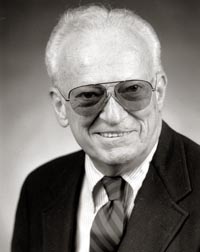|
This is an archived article.
For the latest news, go to the Advance
Homepage
For more archives, go to the Advance Archive/Search Page. |
||
|
'Bud' Roper, Polling Expert,
Dies At 77
Burns "Bud" Roper, a renowned polling expert and long-time chair of the board of directors of the University's Roper Center for Public Opinion Research, died Jan. 20 of lung cancer. He was 77. Roper, who retired in 1994, was the son of Elmo Roper, who founded the Roper Center soon after World War II. The Center houses the most extensive collection of public opinion data in the world. Bud Roper continued to attend board meetings until last year.
Born in Iowa, the younger Roper attended Yale University. During World War II, he flew 35 bombing missions over Europe as an Army Air Corps pilot or co-pilot. He stayed in touch with his fellow airmen for the rest of his life. He began working for his father's polling firm, Elmo Roper and Associates, after the war and rose to the position of chairman of what later became known as the Roper Organization. The firm is now known as RoperASW. Roper had great respect for the American public. "I'm a strong defender of the average American," he was quoted as saying in an interview published in the winter edition of Public Perspective. "He may not be terribly articulate or literate, but he's a pretty smart guy." Lois Timms-Ferrara, associate director of the Roper Center, says Roper believed carefully worded questions could elicit significant information about public values. "The notion of asking the right question was key with him," she says. "He always gave credit to the common man." It was Roper who crafted the question, "Do you feel things in this country are generally going in the right direction, or do you feel that things have gone off on the wrong track?" The question, first posed around 1970, is still used as a way of gauging public sentiment. Known for his integrity, Roper helped write standards for polling methods and wording of questions, which were made public so the results of polls could be better evaluated. While working in Manhattan, he used to drive to Storrs each week to teach in the master's program on public opinion research. A graduate of the program, Sally Daniels, who is one of several Roper recruited to join his firm, says "Bud helped me to define for myself what is and isn't good survey research." She says he had an anecdote for every occasion and brought what the students were learning to life. "He brought it all home," she says, "and let us see how the research would be used to answer clients' questions." Roper's professional career was marked by a couple of major controversies. The first came shortly after he joined his father's firm, when the firm's poll and others had erroneously predicted that New York Governor Thomas Dewey would beat Harry Truman in the 1948 presidential race. Afterward, he persuaded his father and others in the firm to admit they'd made a mistake and to try to find out why. The analysis led to new, improved polling methods, including random sampling. Another controversy occurred in 1992, when a survey commissioned by the American Jewish Committee found that one in five respondents believed the Holocaust never happened. After Roper discovered that one of the questions had been confusingly worded, with a double negative, he ordered the question reworded and paid himself for the survey to be re-administered - with very different results. A strong advocate of in-person interviews, Roper deplored the growing use of telephone surveys, saying they turned people off and skewed poll results. Until shortly before his death, "he was still trying to figure out a way to make the interview experience more positive," says Timms-Ferrara. After retiring, he moved to Cape Cod, where he served on the local zoning appeals board. He also met once a week with his former flying associates. Roper leaves three sons, a daughter, and three grandchildren. |

